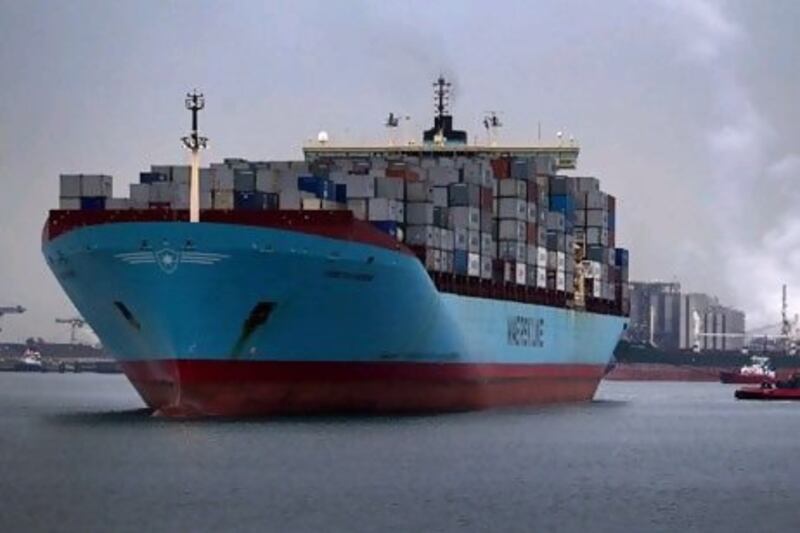The global shipping industry is facing controversial emissions charges similar to those dogging global airlines as the European Commission draws up harsh new environmental regulations.
Such a move would drive up shipping costs at a time when the industry is struggling to make a profit against the effects of the euro crisis, a downturn in Chinese manufacturing, already high fuel costs and a chronic over-capacity of ships.
Any added cost to the shipping industry automatically increases prices for everything carried by sea, from oil to soya beans and natural gas.
More than 90 per cent of the world's trade travels by sea, equivalent to 8.5 billion tonnes a year.
At a seminar in Brussels last week, Elina Bardram, the head of the international carbon market unit at the EC said the decision on shipping had been taken because of the inability of the UN's international maritime organisation (IMO) to provide unique and timely solutions for cutting emissions from ships.
She said the IMO been unable to agree on measures to curb emissions from ships for more than a decade, so the EU now intended to assume the leading role in creating a more stringent legislative framework.
It expected to unveil in "coming months" a series of measures, which could include bringing shipping into the EC's emissions trading scheme (ETS).
"We are including different types of measures, ranging from measurement, reporting and verification, to technical standards, to setting baselines. These options are all on the table," said Ms Bardam.
"The ETS-type schemes are part of the options being considered. We have to develop standards that are meaningful and ambitious enough to do something that is sufficient … today."
The ETS is the world's biggest "cap and trade carbon market". It imposes pollution limits on about 12,000 companies and expanded this year to include flights to and from EU airports, a move that has already threatened to start a trade war.
According to the EC, ships arriving at or departing from EU ports account for 6.1 per cent of the EU's total emissions and for 3 per cent of world shipping emissions. It is estimated greenhouse gas emissions from ships will increase by between 150 and 200 per cent by 2050.
The latest attempt by the IMO's marine environment protection committee to reach agreement on emissions policy ended last Friday without making "tangible progress" after a week of talks. Its discussions on market-based measures, such as a levy on carbon dioxide emissions and a cap-and-trade scheme, are not due to resume until next month.
However, the IMO insists it has already implemented numerous steps on curbing emissions that fully recognise the "urgency" to reduce greenhouse gases from shipping, said Andreas Chrysostomou, the chairman of the committee.
The IMO has already introduced mandatory efficiency measures, established a group to evaluate proposals on market-based mechanisms and wants to continue the developments next year.
Measures include the energy efficiency design index (EEDI) in July last year. The binding measure sets technical standards, such as ship design, for improving the energy efficiency of new vessels. It becomes mandatory, starting in 2015, and will limit the expected gas emissions increase by reducing fuel consumption of ships by as much as 15 million tonnes in 2020, a 14 per cent reduction and by 2050 by as much as 1,01 trillion tonnes. This would lead to savings in fuel costs for the shipping industry of up to US$200 billion (Dh734.62bn) a year, said the IMO.
Peter Hinchliffe, of the International Chamber of Shipping (ICS), which represents about 80 per cent of merchant tonnage around the world, questioned whether the EU and governments should interfere in the setting of maritime emissions rates, calling the EC's proposals an "impediment" to the IMO and "entirely political."
He said the IMO "should be allowed to complete work on emissions without obstruction from regional international bodies with specific agendas".
"Multilateral collaborative action will be best achieved by governments at the IMO," the ICS said in its official statement on emissions control. "[Only] the IMO has a successful track record for the development of global regulations governing the shipping industry's environmental performance."
The ICS said already "shipping companies have a very strong incentive to reduce their fuel consumption and thus reduce their CO2 emissions: bunker costs represent an increasingly significant proportion of ships' operational expenses, having increased by about 300 per cent in the last five years. There is every expectation that marine bunker prices will remain high. Furthermore, the cost of ships' fuel is expected to increase by a further 50 per cent as result of ... new IMO rules."
Other industry watchers warn any additional charges on shipping would prove inflationary.
They would hit the world economy by effectively "taxing' everything carried by sea, said Shehan Mohamed, a senior economist at the Centre for Economics and Business Research in London.





